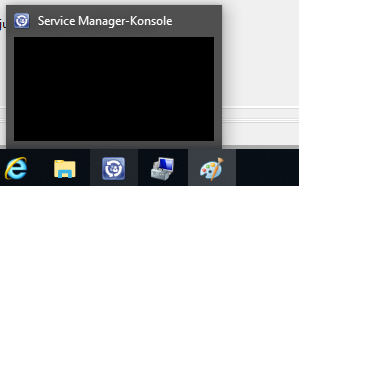I installed the scsm console ur5 on my local machine. After I created a template with respect to custom incident-form based on custom incident-class the console closed with the error below (attention the error is not related to the restarting process of the console). Now if I try to restart the console, the application does not appear. Only a small black preview on the task panel is displayed as you can see in the attachment. This only affects my user account on my machine. I can still run the console with my account from other machines and with different user-accounts from my machine as well. I also reinstalled the console but it does not change the behavior of the application. I can't reproduce the issue with other users. What I mean is, if I try to create a template as I described, the console closed with error but I can restart the application. Any suggestion?

System.ArgumentException: propertyName
bei Microsoft.EnterpriseManagement.UI.SdkDataAccess.DataAdapters.EnterpriseManagementObjectDataTypeBase`1.GetPropertyValue(Object source, String propertyName)
bei Microsoft.EnterpriseManagement.UI.SdkDataAccess.DataAdapters.BindableCachedDataItem`1.get_Item(String propertyName)
bei Microsoft.EnterpriseManagement.ServiceManager.Incident.Forms.IncidentFormControl.ShowAffectedCIs(IDataItem incidentItem)
bei Microsoft.EnterpriseManagement.ServiceManager.Incident.Forms.IncidentFormControl.IncidentDataItem_PropertyChanged(Object sender, PropertyChangedEventArgs e)
bei Microsoft.EnterpriseManagement.ServiceManager.Incident.Forms.IncidentFormControl.InitializeFormView()
bei Microsoft.EnterpriseManagement.ServiceManager.Incident.Forms.IncidentFormControl.OnDataContextChanged(Object sender, DependencyPropertyChangedEventArgs e)
bei System.Windows.DependencyPropertyChangedEventHandler.Invoke(Object sender, DependencyPropertyChangedEventArgs e)
bei System.Windows.FrameworkElement.RaiseDependencyPropertyChanged(EventPrivateKey key, DependencyPropertyChangedEventArgs args)
bei System.Windows.FrameworkElement.OnDataContextChanged(DependencyObject d, DependencyPropertyChangedEventArgs e)
bei System.Windows.DependencyObject.OnPropertyChanged(DependencyPropertyChangedEventArgs e)
bei System.Windows.FrameworkElement.OnPropertyChanged(DependencyPropertyChangedEventArgs e)
bei System.Windows.DependencyObject.NotifyPropertyChange(DependencyPropertyChangedEventArgs args)
bei System.Windows.DependencyObject.UpdateEffectiveValue(EntryIndex entryIndex, DependencyProperty dp, PropertyMetadata metadata, EffectiveValueEntry oldEntry, EffectiveValueEntry& newEntry, Boolean coerceWithDeferredReference, Boolean coerceWithCurrentValue, OperationType operationType)
bei System.Windows.DependencyObject.SetValueCommon(DependencyProperty dp, Object value, PropertyMetadata metadata, Boolean coerceWithDeferredReference, Boolean coerceWithCurrentValue, OperationType operationType, Boolean isInternal)
bei System.Windows.DependencyObject.SetValue(DependencyProperty dp, Object value)
bei Microsoft.EnterpriseManagement.UI.FormsInfra.FormView.SetupNewForm(FrameworkElement newValue)
bei Microsoft.EnterpriseManagement.UI.FormsInfra.FormView.OnFormChanged(FrameworkElement oldForm, FrameworkElement newForm)
bei Microsoft.EnterpriseManagement.ServiceManager.UI.Console.FormView.OnFormChanged(FrameworkElement oldForm, FrameworkElement newForm)
bei Microsoft.EnterpriseManagement.UI.FormsInfra.FormView.HandleFormChanged(FrameworkElement oldForm, FrameworkElement newForm)
bei Microsoft.EnterpriseManagement.UI.FormsInfra.FormViewController.SourceAttached(Object sender, SourceChangedEventArgs e)
bei System.Windows.RoutedEventArgs.InvokeHandler(Delegate handler, Object target)
bei System.Windows.RoutedEventHandlerInfo.InvokeHandler(Object target, RoutedEventArgs routedEventArgs)
bei System.Windows.EventRoute.InvokeHandlersImpl(Object source, RoutedEventArgs args, Boolean reRaised)
bei System.Windows.UIElement.RaiseEventImpl(DependencyObject sender, RoutedEventArgs args)
bei System.Windows.PresentationSource.UpdateSourceOfElement(DependencyObject doTarget, DependencyObject doAncestor, DependencyObject doOldParent)
bei System.Windows.PresentationSource.OnVisualAncestorChanged(DependencyObject uie, AncestorChangedEventArgs e)
bei System.Windows.UIElement.OnVisualAncestorChanged(Object sender, AncestorChangedEventArgs e)
bei System.Windows.Media.Visual.ProcessAncestorChangedNotificationRecursive(DependencyObject e, AncestorChangedEventArgs args)
bei System.Windows.Media.Visual.AddVisualChild(Visual child)
bei System.Windows.FrameworkElement.set_TemplateChild(UIElement value)
bei System.Windows.Controls.ContentPresenter.UseContentTemplate.BuildVisualTree(FrameworkElement container)
bei System.Windows.StyleHelper.ApplyTemplateContent(UncommonField`1 dataField, DependencyObject container, FrameworkElementFactory templateRoot, Int32 lastChildIndex, HybridDictionary childIndexFromChildID, FrameworkTemplate frameworkTemplate)
bei System.Windows.FrameworkTemplate.ApplyTemplateContent(UncommonField`1 templateDataField, FrameworkElement container)
bei System.Windows.FrameworkElement.ApplyTemplate()
bei System.Windows.FrameworkElement.MeasureCore(Size availableSize)
bei System.Windows.UIElement.Measure(Size availableSize)
bei System.Windows.Controls.Control.MeasureOverride(Size constraint)
bei System.Windows.FrameworkElement.MeasureCore(Size availableSize)
bei System.Windows.UIElement.Measure(Size availableSize)
bei MS.Internal.Helper.MeasureElementWithSingleChild(UIElement element, Size constraint)
bei System.Windows.Controls.ContentPresenter.MeasureOverride(Size constraint)
bei System.Windows.FrameworkElement.MeasureCore(Size availableSize)
bei System.Windows.UIElement.Measure(Size availableSize)
bei System.Windows.Controls.DockPanel.MeasureOverride(Size constraint)
bei System.Windows.FrameworkElement.MeasureCore(Size availableSize)
bei System.Windows.UIElement.Measure(Size availableSize)
bei System.Windows.Controls.Border.MeasureOverride(Size constraint)
bei System.Windows.FrameworkElement.MeasureCore(Size availableSize)
bei System.Windows.UIElement.Measure(Size availableSize)
bei System.Windows.Controls.Control.MeasureOverride(Size constraint)
bei System.Windows.FrameworkElement.MeasureCore(Size availableSize)
bei System.Windows.UIElement.Measure(Size availableSize)
bei System.Windows.Controls.Border.MeasureOverride(Size constraint)
bei System.Windows.FrameworkElement.MeasureCore(Size availableSize)
bei System.Windows.UIElement.Measure(Size availableSize)
bei System.Windows.Controls.Control.MeasureOverride(Size constraint)
bei System.Windows.FrameworkElement.MeasureCore(Size availableSize)
bei System.Windows.UIElement.Measure(Size availableSize)
bei System.Windows.Controls.Grid.MeasureCell(Int32 cell, Boolean forceInfinityV)
bei System.Windows.Controls.Grid.MeasureCellsGroup(Int32 cellsHead, Size referenceSize, Boolean ignoreDesiredSizeU, Boolean forceInfinityV, Boolean& hasDesiredSizeUChanged)
bei System.Windows.Controls.Grid.MeasureOverride(Size constraint)
bei System.Windows.FrameworkElement.MeasureCore(Size availableSize)
bei System.Windows.UIElement.Measure(Size availableSize)
bei System.Windows.Controls.Control.MeasureOverride(Size constraint)
bei System.Windows.FrameworkElement.MeasureCore(Size availableSize)
bei System.Windows.UIElement.Measure(Size availableSize)
bei MS.Internal.Helper.MeasureElementWithSingleChild(UIElement element, Size constraint)
bei System.Windows.Controls.ContentPresenter.MeasureOverride(Size constraint)
bei System.Windows.FrameworkElement.MeasureCore(Size availableSize)
bei System.Windows.UIElement.Measure(Size availableSize)
bei System.Windows.ContextLayoutManager.UpdateLayout()
bei System.Windows.ContextLayoutManager.UpdateLayoutCallback(Object arg)
bei System.Windows.Media.MediaContext.FireInvokeOnRenderCallbacks()
bei System.Windows.Media.MediaContext.RenderMessageHandlerCore(Object resizedCompositionTarget)
bei System.Windows.Media.MediaContext.RenderMessageHandler(Object resizedCompositionTarget)
bei System.Windows.Threading.ExceptionWrapper.InternalRealCall(Delegate callback, Object args, Int32 numArgs)
bei System.Windows.Threading.ExceptionWrapper.TryCatchWhen(Object source, Delegate callback, Object args, Int32 numArgs, Delegate catchHandler)
bei System.Windows.Threading.DispatcherOperation.InvokeImpl()
bei System.Threading.ExecutionContext.RunInternal(ExecutionContext executionContext, ContextCallback callback, Object state, Boolean preserveSyncCtx)
bei System.Threading.ExecutionContext.Run(ExecutionContext executionContext, ContextCallback callback, Object state, Boolean preserveSyncCtx)
bei System.Threading.ExecutionContext.Run(ExecutionContext executionContext, ContextCallback callback, Object state)
bei MS.Internal.CulturePreservingExecutionContext.Run(CulturePreservingExecutionContext executionContext, ContextCallback callback, Object state)
bei System.Windows.Threading.DispatcherOperation.Invoke()
bei System.Windows.Threading.Dispatcher.ProcessQueue()
bei System.Windows.Threading.Dispatcher.WndProcHook(IntPtr hwnd, Int32 msg, IntPtr wParam, IntPtr lParam, Boolean& handled)
bei MS.Win32.HwndWrapper.WndProc(IntPtr hwnd, Int32 msg, IntPtr wParam, IntPtr lParam, Boolean& handled)
bei MS.Win32.HwndSubclass.DispatcherCallbackOperation(Object o)
bei System.Windows.Threading.ExceptionWrapper.InternalRealCall(Delegate callback, Object args, Int32 numArgs)
bei System.Windows.Threading.ExceptionWrapper.TryCatchWhen(Object source, Delegate callback, Object args, Int32 numArgs, Delegate catchHandler)
bei System.Windows.Threading.Dispatcher.LegacyInvokeImpl(DispatcherPriority priority, TimeSpan timeout, Delegate method, Object args, Int32 numArgs)
bei MS.Win32.HwndSubclass.SubclassWndProc(IntPtr hwnd, Int32 msg, IntPtr wParam, IntPtr lParam)
bei MS.Win32.UnsafeNativeMethods.DispatchMessage(MSG& msg)
bei System.Windows.Threading.Dispatcher.PushFrameImpl(DispatcherFrame frame)
bei System.Windows.Window.ShowHelper(Object booleanBox)
bei System.Windows.Window.ShowDialog()
bei Microsoft.EnterpriseManagement.ConsoleFramework.WindowManager.GenericWpfWindowConstructor.BeginShow(ShowViewContext showViewContext, Object parent, Object view, AsyncCallback callback, Object state)
bei Microsoft.EnterpriseManagement.ConsoleFramework.ViewConstructor.BeginShow(ShowViewContext showViewContext, AsyncCallback callback, Object state)
bei Microsoft.EnterpriseManagement.ConsoleFramework.WindowManager.WpfWindowRecord.ShowWindow()
bei System.Threading.ExecutionContext.RunInternal(ExecutionContext executionContext, ContextCallback callback, Object state, Boolean preserveSyncCtx)
bei System.Threading.ExecutionContext.Run(ExecutionContext executionContext, ContextCallback callback, Object state, Boolean preserveSyncCtx)
bei System.Threading.ExecutionContext.Run(ExecutionContext executionContext, ContextCallback callback, Object state)
bei System.Threading.ThreadHelper.ThreadStart()

